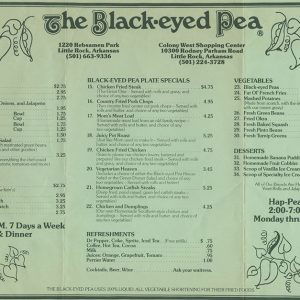calsfoundation@cals.org
Dixie Cafe
The Dixie Cafe was a chain of home-cooking restaurants based in Little Rock (Pulaski County) that grew into twenty-three locations in three states before abruptly closing in late 2017.
In August 1980, Little Rock businessman Dan Lasater, who had founded the Ponderosa steakhouse chain, and partners Garland Streett and Allan Roberts bought a building at 1220 Rebsamen Park Road in Little Rock and announced they were going to convert it into a new restaurant as part of the Black-eyed Pea chain (based in Dallas, Texas), which offered home-style cooking in a casual dining atmosphere. The new restaurant opened in late October 1980.
“The food comes close to rivaling that of smaller, well-established restaurants,” an Arkansas Gazette reviewer wrote in November 1980. “The only differences are the large size of the Black-eyed Pea [physically], its fancier dining area and the slightly higher prices and smaller quantities.” Diners could get a chicken-fried steak with two vegetables for $4.25 or a Vegetarian Heaven for $2.95.
Lasater, who was running into a variety of legal problems, and partner Garland Streett sold their interests in the Black-eyed Pea, which by that time had stores in Little Rock and Memphis, Tennessee, to partner Allan Roberts and Gordon Godek, a former vice president of Andy’s of America Inc., in early October 1986; Roberts and Godek named their new firm Dixie Restaurants, Inc. In November, they announced that they would change their restaurants’ names to the Dixie Cafe, which Roberts called the “final culmination of separating our locally owned restaurants from the rest of the Black-eyed Pea chain.”
By 1999, Dixie Restaurants had twenty-three restaurants in Arkansas, Tennessee, and Oklahoma; some were called Delta Cafe to avoid confusion with the rival Dixie House chain. Three years later, sales were estimated at between $30 and $35 million annually, and the firm had around 1,100 employees. In 2005, Dixie Restaurants opened the Fire Fall Grill & Bar in North Little Rock (Pulaski County), a venture into what it called “upscale casual.” It closed three years later, reportedly because of the economic recession that was occurring at the time.
By the second decade of the twenty-first century, restaurants were trending toward a “fast casual” concept where customers bought higher-quality food at a counter as opposed to the table service of the Dixie Cafe’s “casual dining” model. In 2017, the chain was down to seventeen restaurants, and on December 4, Roberts announced that all of restaurants were closing, saying, “It’s a very difficult environment for full-service, family-oriented restaurants. We have seen declining sales combined with increasing costs that [have] made this difficult decision necessary.”
For additional information:
“Changing Business Scene.” Arkansas Gazette, August 31, 1980, p. 1E.
Cottingham, Jan. “What Drove Dixie Cafe Down?” Arkansas Business, April 30, 2018.
“Eateries Renamed.” Arkansas Democrat, November 9, 1986, p. 6H.
Harrison, Eric E. “Dixie Cafe Diners, Staff Say Farewell.” Arkansas Democrat-Gazette, December 7, 2017, p. 51.
“Interest Sold in Firm Running Black-eyed Pea Restaurants.” Arkansas Gazette, October 8, 1986, p. 8C.
Kirby Sally. “Good Home Cooking Moves ‘Uptown’ at the Black-eyed Pea.” Arkansas Gazette, November 14, 1980, p. 3B.
Maxey, Ron. “Dixie Cafe Closing Two Memphis-Area Restaurants.” Commercial Appeal (Memphis, Tennessee), December 5, 2017, p. 11.
Miller, Linda. “Down Home Cooking at the ‘Pea.’” Arkansas Times, August 1977, pp. 8–9.
“New Restaurant Opens at LR.” Arkansas Gazette, November 2, 1980, p. 8E.
Steed, Stephen, and Nathan Owens. “All Dixie Cafes in Arkansas to Shut.” Arkansas Democrat-Gazette, December 5, 2017, p. 23.
Tucker, Tyler. “Lasater Sells Stake in Eateries.” Arkansas Democrat, October 8, 1986, pp. 1A, 5A.
Mark K. Christ
Central Arkansas Library System
 Business, Commerce, and Industry
Business, Commerce, and Industry Divergent Prosperity and the Arc of Reform, 1968–2022
Divergent Prosperity and the Arc of Reform, 1968–2022 Food and Foodways
Food and Foodways Black-Eyed Pea Menu
Black-Eyed Pea Menu 



I miss the delicious food at Dixie Cafe. We went there once or twice a week for lunch from 2005+. Always generous portions, great service, a clean restaurant, and a reasonable price ticket. I loved the fried chicken tender salad. Such a big hole that hasn’t been filled since Dixie Cafe closed.